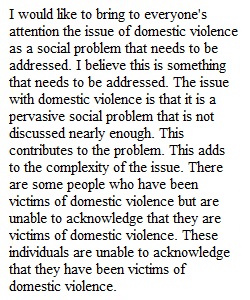


Q Advocacy Project Part 1: Social Problem Analysis • Points 100 • Submitting a file upload Instructions For this assignment and the remainder of the semester, you are going to focus on one social problem. We are going to define it in this module and work toward creating change to improve the lives of those affected in future modules. In this assignment, answer the following questions. 1. What is the social problem that you would like to address? o Define the problem in one paragraph. 2. Why did you choose to focus on this problem? o Answer in one paragraph; this section can be in first person. 3. Who is affected by this problem? o Describe what groups of people are affected, how they are affected, and how much they are affected. Focus specifically on vulnerable or marginalized populations. In this assignment, it can be very tempting to jump ahead to solving the problem. We will get there, I promise! But for now, focus on defining the problem, not solving it. Otherwise, we can't know if we've solved it, because we won't know what we are trying to solve. Requirements • Upload your completed assignment as a Word document or PDF by the posted due date. o Plagiarism detection software may be used. • Your assignment should be written in APA format as a complete paper rather than in a Q&A format. In addition, only Part B can be in first person. o All facts in the paper and ideas that are not your own should be cited in APA style, using in-text citations for at least two sources. You can use course readings as these sources. o Other than the paragraph about why you have chosen the problem, everything else should be in third person. • The length of your assignment should be two pages of text (approximately 500-700 words), plus an APA style title page and a reference list. It does not require an abstract. Rubric Advocacy Assignment, Part 1: Social Problem Analysis Advocacy Assignment, Part 1: Social Problem Analysis Criteria Ratings This criterion is linked to a Learning OutcomeSocial Problem Definition Excellent Student adeptly defines the social problem, using their own words, and utilizing concepts from this and other courses. Good job Student appropriately defines the social problem. Needs Improvement Student did not adequately define the social problem. This criterion is linked to a Learning OutcomeFocus/Interest Excellent Student adeptly describes their reason for selecting this particular problem for study. Good Job Student appropriately describes the reason for selecting this particular problem for study. Needs Improvement Student did not adequately describe their reason for selecting this particular problem for study. This criterion is linked to a Learning OutcomeWriting:Purpose & Content Excellent The purpose is readily apparent to the reader. Balanced presentation of relevant and legitimate information that clearly supports the central purposes and shows a thoughtful, in-depth analysis. Reader gains important insights. Satisfactory The purpose is clear, but there are some digressions from it. Information provides reasonable support for the central purposes and displays evidence of a basic analysis of the topic. Reader gains some insights. Needs Improvement Central purposes are not addressed. Analysis is basic, vague or not evident. Reader gains few insights, or is confused or may be misinformed. This criterion is linked to a Learning OutcomeWriting: Length, Structure, Grammar/Spelling, Diction/Style Excellent The length and structure of the post supports understanding of the content, and furthers the purpose. The writing is free or almost free of errors. The tone is consistently appropriate. Satisfactory The writing generally flows smoothly. The length and tone are generally appropriate for the assignment. Word choice is generally good. There are occasional spelling/grammatical errors, but they don't represent a major distraction or obscure meaning. Needs Improvement The length and/or structure may not be appropriate to the assignment. The tone may be inappropriate for the assignment. There may be many spelling and/or grammatical errors, that meaning/purpose is obscured. This criterion is linked to a Learning OutcomeWriting:Connections & Reference to Other Course Materials Excellent The student clearly connects their work on this assignment with material that they have read, or worked on in this course and/or other courses in the program. References are appropriately used, and correctly cited. Satisfactory The student makes basic connections in this assignment to other material they may have read or learned in this course, or in another course in the social work program. References may be made, but not correctly formatted. Needs Improvement Student does not make connections to other materials in this course or others. References are absent. This criterion is linked to a Learning OutcomeImpacted Groups Excellent Student adeptly identifies, and defines, a vulnerable or marginalized population impacted by this social problem, with particular attention to how they are impacted and how much they are impacted. Satisfactory Student appropriately identifies and defines a vulnerable or marginalized population impacted by the social problem. Needs Improvement Student does not adequate identify and/or define a vulnerable/marginalized population impacted by the social problem.
View Related Questions